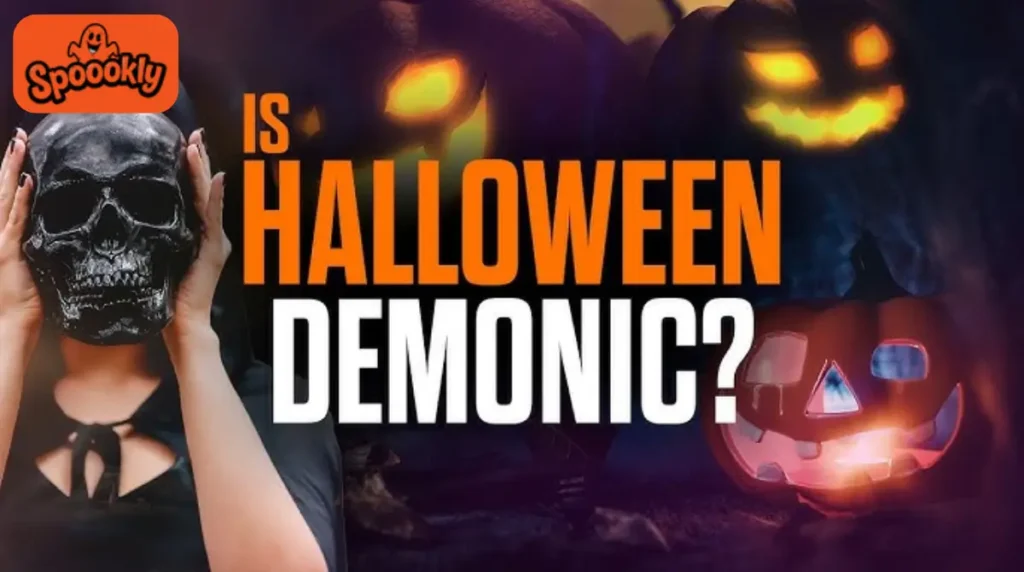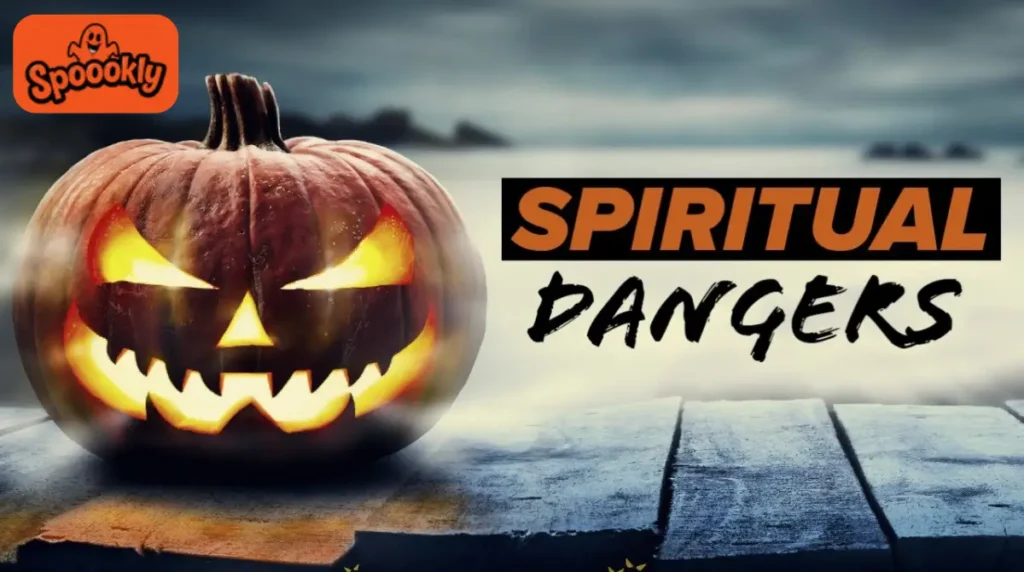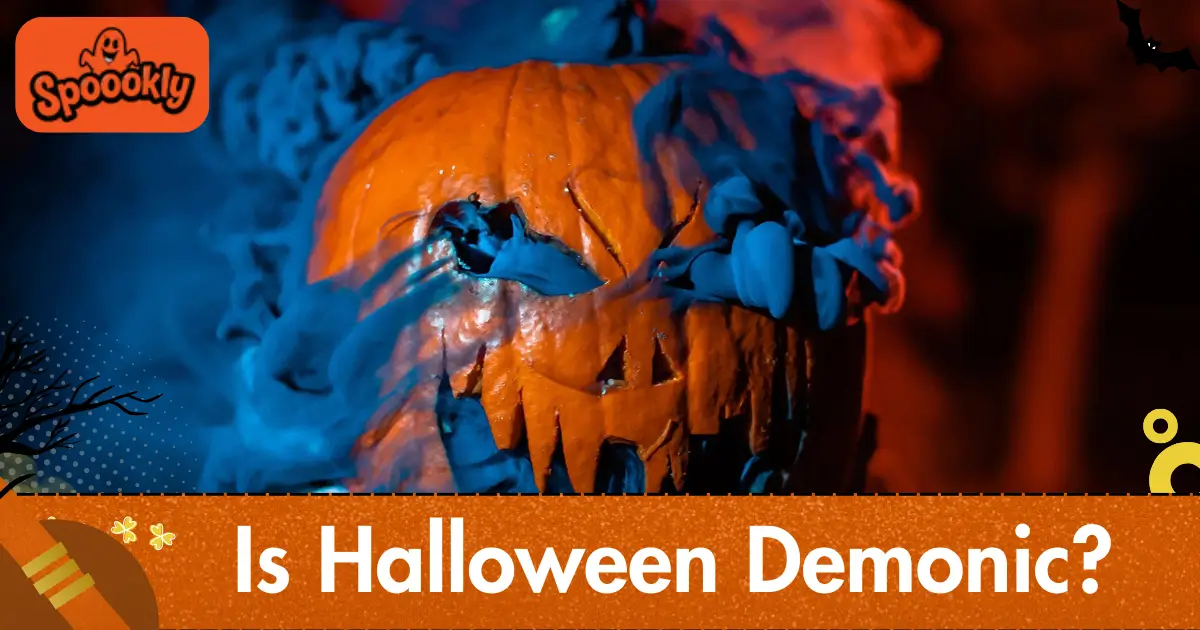Every October, the same debate pops up: is Halloween demonic?
Some people see it as a night of costumes, candy, and community fun. Others worry it’s tied to evil forces or Satanism.
Here’s the truth. Halloween’s story is far more layered than the myths suggest. It’s not a simple “good versus evil” holiday. Its roots span ancient pagan traditions, Christian festivals, and modern pop culture.
In this article, I’ll discuss where Halloween came from, why some call it satanic, and why most historians and faith leaders disagree.
So, is Halloween satanic? My short answer: not really. But the details matter. Let’s look deeper.
Definitions & Clarifications
What Does “Satanic” Actually Mean?
The word “satanic” often gets thrown around loosely. In religion, it means worship or devotion to Satan. In popular culture, it gets stretched to describe anything dark, creepy, or spooky.
Halloween often gets labeled satanic because of its spooky imagery: witches, skeletons, and ghosts. But imagery and intent are very different things. Dressing up as a vampire isn’t the same as joining a satanic cult.
Pagan vs. Occult vs. Satanism
It helps to separate key terms that often get mixed together:
| Term | What It Means | Connection to Halloween |
|---|---|---|
| Pagan | Ancient, pre-Christian beliefs and nature-based rituals | Celtic festival of Samhain |
| Occult | Practices linked to hidden knowledge, magic, or spiritual rituals | Fortune-telling, séances |
| Supernatural | Anything beyond natural explanation | Ghost stories, legends |
| Witchcraft | Practices tied to magic, sometimes linked to folklore or religion | Popular in costumes |
| Satanism | Worship of Satan or use of his imagery in ritual | Rare, not part of mainstream Halloween |
As you can see, Halloween has more ties to pagan and folk traditions than actual Satanism.
Why the Question Matters Today
People ask whether Halloween is demonic because:
- It uses dark and spooky symbols.
- Some faith groups warn against it.
- Popular culture exaggerates the “evil” vibe.
This makes it a cultural question, not just a religious one.

Historical Origins of Halloween
From Samhain to Spirits
Halloween traces back to Samhain, an ancient Celtic festival marking the end of harvest and start of winter.
People believed the boundary between the living and dead blurred on this night. Bonfires, costumes, and rituals were meant to protect them from wandering spirits.
These practices were pagan, but not satanic. They focused on seasons, survival, and respect for nature.
Christian Adoption and All Hallows’ Eve
As Christianity spread, the Church layered new meaning on existing traditions. November 1 became All Saints’ Day, honoring saints and martyrs. The evening before was All Hallows’ Eve, which over time became Halloween.
This blending turned Halloween into a mix of Christian remembrance and folk customs.
Medieval Europe and Local Customs
During the Middle Ages, Halloween looked different across Europe. People practiced souling (going door-to-door for food in exchange for prayers), lit bonfires, and wore masks to ward off spirits.
None of these were satanic acts. They were cultural responses to fear of death, seasons, and community beliefs.
Halloween Today: More Candy Than Cults
Fast forward to the modern world. Halloween is now about costumes, trick-or-treating, horror movies, and pumpkins. While some fringe groups may tie the night to occult practices, for the majority, it’s a social and cultural event.
Why Some People Call Halloween “Satanic”
The Dark Imagery of Halloween
Skeletons, witches, ghosts, bats, black cats, Halloween thrives on spooky vibes. For many, these are just costumes and decorations. For others, they symbolize death, curses, or even demons.
The heavy use of occult-like symbols makes some believe the holiday celebrates evil forces. But remember: symbols only carry the meaning we give them. A plastic skull on a lawn doesn’t summon spirits.
Fear of Spirit Contact
Because Halloween has roots in Samhain, where the dead were believed to walk the earth, some argue the holiday invites unwanted spiritual contact.
Add in things like ouija boards, seances, or fortune-telling, and you can see why some religious groups wave a red flag.
Religious Objections to Halloween
Certain Christian groups oppose Halloween strongly. They quote scripture that forbids witchcraft, sorcery, or consulting the dead. For them, even playful costumes feel like compromise.
You’ll sometimes hear it called the “Devil’s Holiday.” In these circles, Halloween is treated as a direct path to demonic influence.
Extreme Portrayals
Some articles and pastors have described Halloween as an “open door” for Satanism. Others call it a disguised celebration of death.
While these views get attention, they don’t reflect historical evidence. In reality, most Halloween activities are community traditions, not occult rituals.
Counterarguments & More Balanced Perspectives
Halloween Is Mostly Secular Today
Most people celebrating Halloween don’t think about spirits or demons. They think about costumes, kids running door to door, and too much candy. Cultural doesn’t equal spiritual.
Symbolism Doesn’t Equal Worship
Wearing a witch hat or carving a pumpkin doesn’t mean you’re worshiping evil. Symbols often shift meaning across time. A jack-o’-lantern used to represent warding off spirits. Today, it’s just a glowing decoration on the porch.
Christian Thinkers Who See It Differently
Some Christian leaders argue Halloween can be harmless fun. They suggest focusing on community, using costumes as creativity, and teaching kids discernment.
For them, Halloween only becomes dangerous when it crosses into occult practices.
Innocent Fun and Freedom of Conscience
For families, Halloween is what you make it. Some go all in with haunted houses. Others stick to church harvest festivals. And some skip it entirely. The key point? Participation is a personal choice, not a universal spiritual law.
Where It Can Get Tricky
There are blurry areas. If someone mixes Halloween with real occult practices like séances or spellsm then yes, that crosses into spiritual territory. But that’s rare compared to the millions who simply dress up as superheroes or hand out candy.

Comparative Views in Different Religions and Cultures
Christianity: Mixed Perspectives
- Catholic Church: Halloween is tied historically to All Saints’ Eve. Some parishes even encourage participation.
- Protestants: Views vary. Some reject Halloween completely, others host fall festivals as an alternative.
- Evangelicals: Many object, seeing it as spiritually unsafe.
Islam: A Clearer No
In Islam, celebrating non-Islamic religious holidays is often discouraged. Halloween’s focus on spirits, superstition, and imitation of non-Muslim customs makes it off-limits for most scholars.
Judaism: Cultural Neutrality
Halloween is not part of Jewish tradition. Some Jewish families join for fun as a cultural activity, while others avoid it due to its non-Jewish roots.
Other Cultures Worldwide
- In Mexico, Día de los Muertos (Day of the Dead) takes center stage instead of Halloween. It honors ancestors, not demons.
- In Japan, Halloween has been adopted mainly as a pop-culture event with costumes and parties.
- In Ireland, the birthplace of Samhain, Halloween is both a cultural celebration and a nod to heritage.
Myths, Misconceptions & Common Questions
Myth 1: Halloween Is Only for Satanists
This is simply false. Most people who celebrate Halloween are kids in costumes or adults at themed parties. The connection to Satanism exists in fringe groups, not mainstream culture.
Myth 2: Costumes Invite Evil
Some claim wearing a ghost or witch costume opens a spiritual door. But costumes are just play. A child dressed as a skeleton isn’t in danger of being possessed.
Is Trick-or-Treating Spiritual or Occult?
No. Trick-or-treating grew out of medieval souling and later American candy marketing. It’s a social tradition, not a spiritual ritual.
Are Jack-o’-Lanterns, Black Cats, and Witches Evil?
Not inherently. Pumpkins are vegetables, cats are pets, and witches are folklore characters. The meaning depends on context, not the object itself.
Can Halloween Lead to the Occult?
It can, but only if someone chooses to explore occult practices. For the average person, Halloween is no more dangerous than watching a scary movie.
Practical Guidance for Families and Believers
How to Participate Wisely
If you enjoy Halloween but feel uneasy, focus on the lighter side. Stick to costumes, candy, and community fun. Avoid practices tied to occult rituals.
Set Personal Boundaries
- Choose decorations you’re comfortable with.
- Skip haunted houses if they feel too dark.
- Talk with kids about the difference between play and belief.
Alternatives to Halloween
- Church harvest festivals
- Family movie nights with friendly themes
- All Saints’ Eve celebrations
These options keep the community spirit without the spooky edge.
Responding to Questions
If someone asks why you do or don’t celebrate, be clear but kind. Acknowledge that people have different convictions. Respect goes both ways.
Conclusion
After digging through history, religion, and culture, here’s my honest take: Halloween is not inherently satanic.
Its roots are pagan and Christian, not satanic. Its symbols are cultural, not demonic. Its modern form is a mix of candy, costumes, and community.
For some, it may cross a line if occult practices are involved. For others, it’s innocent fun. In the end, Halloween is what you make it.
Final Answer: Halloween is not demonic for the vast majority of people. Your intent, your choices, and your perspective shape how you experience it.
My advice? Think critically, respect your beliefs, and enjoy the parts of Halloween that bring joy, not fear.
FAQs
No. Halloween developed centuries after biblical times.
Yes, but opinions vary. Some embrace it, some adapt it, others avoid it.
Not inherently. The real dangers are more about candy safety and traffic than demons.
Harvest festivals, All Saints’ Eve events, or family nights are common alternatives.
Because of spooky symbols, misunderstandings of history, and some religious objections.

